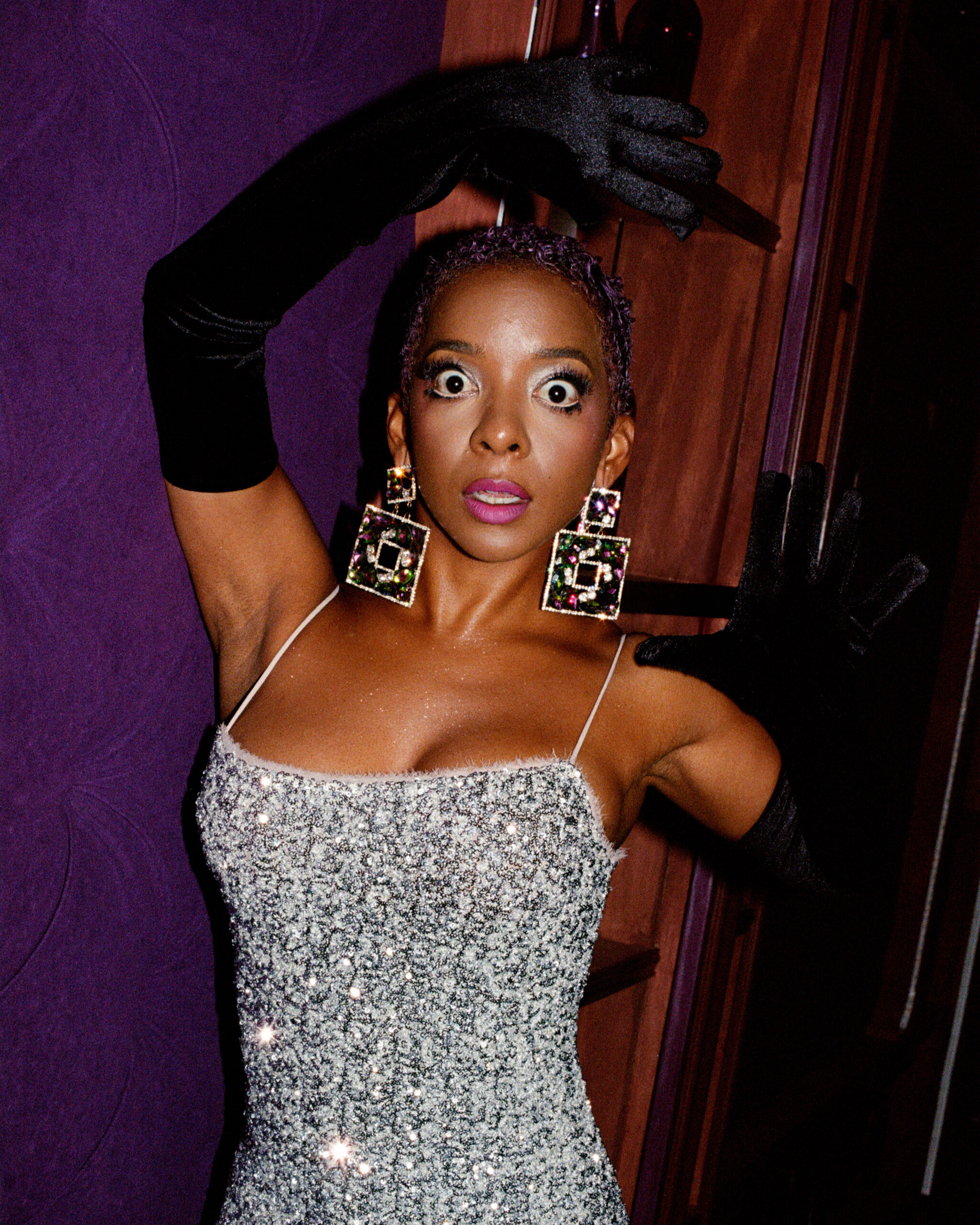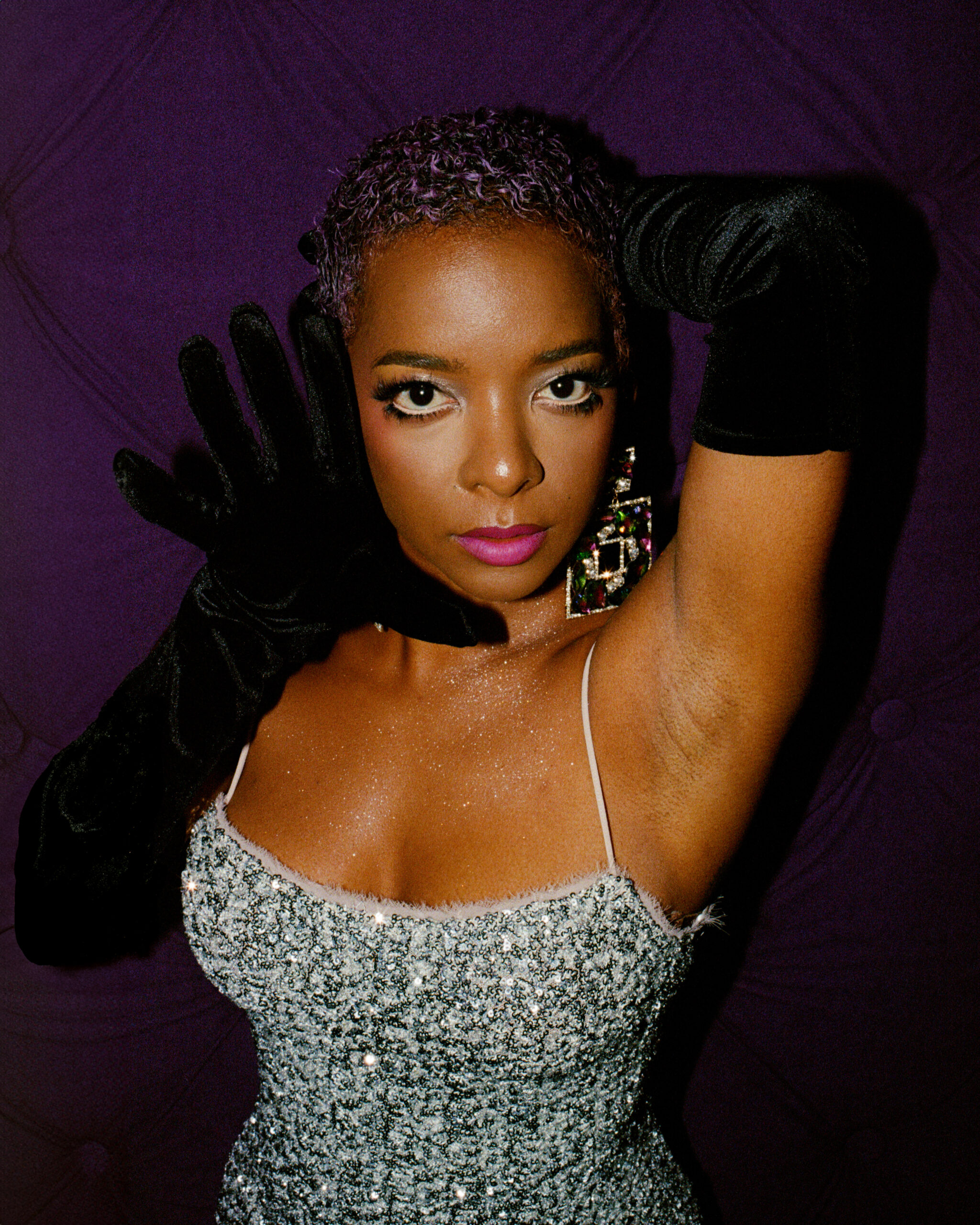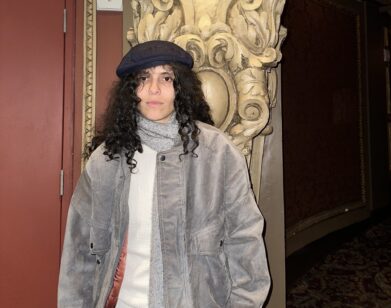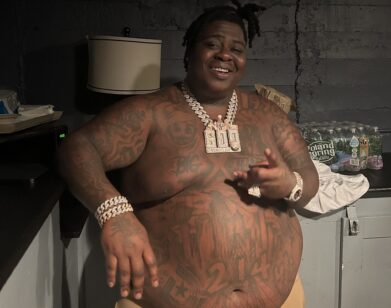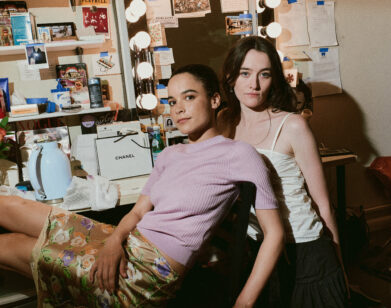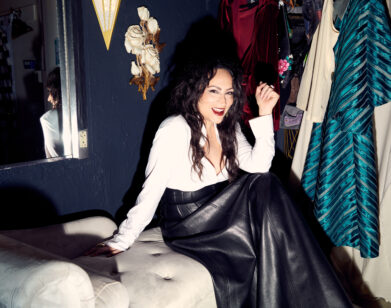BACKSTAGE
“I Always Felt Like Tinkerbell”: Kara Young Takes Us Behind the Scenes of Table 17
Of Kara Young, a swooning stan—me— once wrote that “to fall headfirst for one of her characters is to have seen Kara Young act at all.” That was about her performance in Martyna Majok’s Cost of Living (2022), which earned Young the second of her historic Tony nominated trifecta, bookended by Lynn Nottage’s Clyde’s (2021) and Ossie Davis’ Purlie Victorious (2023), for which finally won Best Featured Actress in a Play. Seeing her accept that statue from Wendell Pierce before dedicating the win to “the vibration of the liberation of humanity” was a perfect encapsulation of Young: deeply embedded in the theater world, but also cool as fuck.
Last I saw her, it was nearing 4 a.m. at the after-after-party for the London premiere of Slave Play, and my flight home to New York the following morning was dreadful. Hers was apparently not, seeing that she had also made it back to the city that day in time for opening night of Broadway’s Oh, Mary! and its after-party at the Eagle. A few weeks later, she began rehearsals for Table 17, a new off-Broadway romantic comedy in which Young, who’s often tapped to play youthful, ingénue types, plays Jada, a thoroughly contemporary woman reunited with her estranged ex, played by Biko Eisen-Martin. At a cabaret table at the MCC Theater, where Table 17 runs through the end of the month, I met Young to talk about feeling nostalgic for classic Black rom-coms, Cats: The Jellicle Ball, and why she’ll always be a Harlem Fairy.
———
JUAN RAMIREZ: How’s your summer been?
KARA YOUNG: Oh my goodness.
RAMIREZ: Did you have a month to calm down after the Tonys?
YOUNG: Kind of, sort of. I was supposed to be doing a show called Syncing Ink that got cut short. The original cast came back after seven years. We actually did it in Houston, Texas the last time, at the Alley Theater. But the day that we opened was the day that we closed, so I got to go to my friend’s wedding in Mexico City. I got to go to London. Where else did I go? I went to Belize for a few days.
RAMIREZ: Fun.
YOUNG: I haven’t been able to go to any openings because I’ve always been in a show, but I was like, “I have to see Oh, Mary! I have to see this incredible play.” Cole Escola is brilliant.
RAMIREZ: You should do Mary once they leave.
YOUNG: Oh my god. That would be insane.
RAMIREZ: I want to go back to your Tony Awards win. I was watching your Tonys speech and the Instagram post you made after. There’s so much to chew on. You wrote, “Friend and mentor Wendell Pierce.” What does that friendship look like?
YOUNG: First of all, I’ve been so fortunate to have such incredible people that are in my corner, literal champions of work, period. Wendell Pierce is like an encyclopedia. He’s such a student of Black film and of plays. He’ll send me lists of plays to look at like, “You need to play this one day,” or “You need to look at this play and you need to play Joan of Arc.” And you can pick apart his brain, because he knows so much.
RAMIREZ: What’s the most out-there movie he’s put you onto?
YOUNG: Oh man, I don’t even remember. I couldn’t even tell you the name of it, but it is something that you actually could find on YouTube.
RAMIREZ: How did this play [Table 17] come into your orbit?
YOUNG: Douglas Lyons reached out to me. I was supposed to do a reading of another play of his but schedules got crazy, so I couldn’t do it. I was booked at the time. And then he asked me to do a reading of Table 17. At the time, we were doing Purlie. We basically rehearsed for two days, and put it up on the third day in front of people, two different readings in the same day. And people had this incredible response to it. It was really wild. Then we did another reading a few months later in a small theater, and again people responded in this really wild, beautiful way. So, this is where we are now.
RAMIREZ: I feel like the characters are so different. How was it existing with them both at the same time?
YOUNG: I’ve kind of trained myself to turn my brain on and off at certain times. You know what I mean? I remember with Halfway Bitches, it ended on the 5th of January and I started rehearsals for All the Natalie Portmans the next day. And then before Halfway Bitches, I was performing at MTC in The New Englanders, by Jeff Augustin, and I was going to rehearsals for Halfway Bitches during the day. It’s that New York hustle life of the theater, right? You’re either in a reading, or you’re performing at night, or you’re performing and rehearsing during the day. Your brain can just compartmentalize as you’re moving through this life.
RAMIREZ: Do you like that non-stop hustle? Are you someone like Nicole Kidman, for example, who is always doing 50 things?
YOUNG: I didn’t even know that about her. I am like that a little bit. I’m from New York, and I don’t know if that has anything to do with it, but it just never stops.
RAMIREZ: Well, you are “The Harlem Fairy” on Instagram. Is that an actual nickname?
YOUNG: Well, I always felt like Tinkerbell. People are like, “What’s your dream role?” I’ve always felt like I was Tinkerbell, like in my spirit. And I’m born and raised in Harlem, so I think it became a nickname and I stuck with it.
RAMIREZ: That’s fun. Tell me about this character, Jada.
YOUNG: The other day, after the performance, a few friends of mine who I haven’t seen in some time were like, “I feel seen.” And I was like, “Oh my god.” That’s the most beautiful thing at the end of the day, for Black women to feel seen. The character is facing herself, in a way, two years after a tumultuous breakup. And facing her ex two years later. She’s stepping into unknown territory but is willing to receive anything that happens on this journey. The play kind of just takes us back in time and shows us what actually went down with these two people who really love each other. And the play asks, “Do the cosmos bring people together for reasons that we can’t explain?” If something happens to end, it doesn’t mean that it wasn’t real. It’s a beautiful love story, but also an introspection on breakups and forgiveness. Even in your biggest mistake, you are worthy of love.
RAMIREZ: Damn. What did your friends connect to, exactly?
YOUNG: I think one person, she had expressed to me that she had been engaged twice, and walking away from that engagement was really challenging and really difficult, but she had to do it. And now she’s married. A lot of the stuff that I do has social and political vibrations, for lack of a better word. And this is about love, and decisions. “Decisions are easy if you can live with them”—that’s what my mom always tells me.
RAMIREZ: I know the play is inspired by a lot of the classic ’90s and 2000s Black romantic dramas. What’s your favorite rom-com from that era?
YOUNG: I have to say, I watched Two Can Play That Game the other day, and I was like, “Wow, this is really a special film.” I mean, you see Vivica A. Fox and Morris Chestnut, you’re like, “Wow, these are classic Black actors.” And what they gave us was this push and pull of just what it means to just like somebody, what it means to love somebody, what it means to play games with someone. I love that movie. I love Love & Basketball. I love me some Sanaa Lathan.
RAMIREZ: I feel like we’re at a point where people really are missing that era of these dramas that just felt like casual movies. Even Purlie, which is a comedy, is about the centuries-long history of racism. I feel like we don’t really have that in film anymore, and we sure as hell don’t have that in theater.
YOUNG: Yeah, literally. Zhailon Levingston directed us. And it isn’t about those bigger issues that people are affected by, but it’s about people who are also affected by love. If anything, we’re really kind of zeroing in on people’s hearts and just really truly thinking about the people that you love. This young woman left the other night and she was like, “I’m going to call my ex. I really fucking love that man.” And I was like, “Oh, damn.” This is the kind of question that people are leaving with. Like, “I need to either make that phone call, or I need to move on.” They’re thinking of things that are literally affecting their hearts, and not in relation to the bigger picture of the world, but their actual hearts, in a wild way. It’s that kind of play.
RAMIREZ: Zhailon also directed Cats: The Jellicle Ball. Did he do the Harlem Ball scene proud?
YOUNG: I will cry if I talk about this production of Cats. I will cry. It’s such a beautiful homage to the history-makers, to the people who literally gave us culture. Everything about that show was a retelling of histories in the most profound way possible. You’re paying respect to the craft of this beautiful thing that was birthed, and now we all love it so much. To me, that show has to go on forever and ever and ever. Everybody needs to see it, everybody needs to know those faces that started it all. So yeah, just 10s, 10s, 10s all around.
RAMIREZ: Were you a guest judge?
YOUNG: Yeah, I was.
RAMIREZ: Wait, how was that?
YOUNG: I was a guest judge with Bevy Smith, another Harlem gem and TV host. She’s just everything. She has her own radio show on SiriusXM. She’s just a legend in Harlem. We judged together and had the best time ever. That’s my greatest honor, being a judge for Cats.
RAMIREZ: To go back to the play, the language is so poetic at times. I’m excited to see you step into the role of a very sensual woman. Tell me how you went about that.
YOUNG: Well, there’s a wig by the incredible Nikiya Mathis. And then Devario, our costume designer, helped too. Putting on the wig and putting on the costume really does shift things. I was in that rehearsal room with my natural hair doing the show, but then when we got into tech and I put on that wig and it just was like, “Woah, who am I? Where am I? This is giving something else, something different, something beyond me.” Those elements help to step into who Jada is, and who she wants to be. The freedoms of what it just means to live in a different body, live in a different kind of space. I’m not somebody who wears wigs, so I’m stepping into new territories every night when I put on Jada.
RAMIREZ: How’s talking to the audience? There’s a lot of fourth wall-breaking.
YOUNG: It’s really great. It’s scary at times, but it’s great. But because we’re in such an intimate space—I think this space holds like, 140 people? The last three years, I’ve been in spaces where it’s 1,200 plus. So this feels so intimate. You’re not just watching actors; everybody’s the fourth character in the play. It’s really a special experience.
RAMIREZ: You were also in the Boots Riley show, I’m A Virgo.
YOUNG: Yeah.
RAMIREZ: First of all, what’s your sign?
YOUNG: Sag. What’s your sign?
RAMIREZ: I’m a Cancer.
YOUNG: Oh, I love you. I love Cancers. They’re my best friends.
RAMIREZ: That makes me feel good. But wait, this Boots Riley show. How was it working with him?
YOUNG: The best time ever. I mean, what a bold, brilliant mind. I’ve said it before, he’s the radical imagination personified. With his pen and with the vision, it’s such a visceral, visual experience. You’re looking at a 13-foot tall Black man in Oakland—what a beautiful metaphor. This gentle giant, his heart is so pure because he hasn’t seen much in the world. He knows so much, but he hasn’t experienced much, and it’s such a beautiful journey to see him go through his life and want more. And the character that I played, Jones, she’s a community organizer. She wants to tell the people that they have more power than what they’ve been told. She wants the people to know that there’s more of us than them, and that we all have to come together in order to make a change. But it’s going to take us being organized in numbers, and for us to know exactly what is going on in our community, so that we can do something about it. It’s so out there. There’s just so much to take in.
RAMIREZ: You really get people with laughter. Who are the other radical artists that you’re drawn to?
YOUNG: I mean, man, Charlie Kaufman. Synecdoche, New York. I find his mind to be so incredibly brilliant, honestly. Who else? Shaka King, I’m such a fan of his work. Martyna Majok, Lynn Nottage, NSangou Njikam, C.A. Johnson, Jeff Augustin. I can go on and on; Just brilliant, brilliant, brilliant playwrights.
RAMIREZ: You’ve worked with some incredible people.
YOUNG: Oh my God, I can’t even believe it. Half the time I’m like, “Pinch me.”

